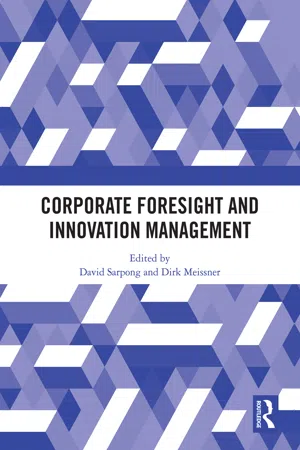ABSTRACT
Despite the importance of corporate foresight for innovation management, scholars have yet to identify the organisational processes through which corporate foresight influences a company’s innovativeness. Drawing on the resource-based view and dynamic capabilities theory, we developed a model and posited that the effect of corporate foresight on innovativeness is mediated by organisational learning, while the relationship between corporate foresight and organisational learning is moderated by integrative capabilities. We conducted an empirical study in the manufacturing industry and found support for the study model, in which the indirect effect of corporate foresight on innovativeness through organisational learning was conditional on the level of integrative capabilities. This study has theoretical and practical implications for a more nuanced understanding of corporate foresight and its effect on innovation management.
Introduction
In order to survive and succeed in today’s complex and volatile business environment, companies increasingly rely on corporate foresight (). Corporate foresight is an organisational resource that includes any cultural or structural element that enables the company to detect change early, identify new promising business fields, analyze the consequences to the company, and formulate effective responses to sustain innovation (). Many companies, accordingly, develop corporate foresight practices to lay the foundation for a future competitive advantage and manage the risk of technology change ().
The corporate foresight literature has generally found a positive relationship between corporate foresight and organisational outcomes such as innovation management and value creation, which can promote new product development and technology advancement (; ; ). However, scholars who have attempted to examine this positive link have frequently struggled to show exactly how and when corporate foresight can lead to innovation (). Additionally, the contextual conditions of corporate foresight in stimulating innovation are often unknown due to the theoretical and methodological complexities involved in mapping intricate routes in the connection, structure, and influence of corporate foresight on innovation management ().
Although the positive relationship between corporate foresight and innovation seems to be intuitive, how corporate foresight can contribute to the innovativeness of the organisation still depends on whether organisations are engaged in organisational learning, such as discussing alternatives, experimenting with new ideas, and solving problems to come up with the best possible way to innovate products, services, and work processes. This study proposes organisational learning as a mediator in the relationship between corporate foresight and innovativeness. The resource-based view (RBV) and organisational learning literatures suggest that organisational learning may be a core underlying mechanism that explains how corporate foresight can be leveraged when an organisation chooses among competing and alternative technological pathways to pursue its future ().
In addition, Rohrbeck and Gemünden () have argued that more research is needed to identify any boundary conditions that may influence the manifestation of innovation. Analyzing the moderating effect of organisational factors will help depict the condition under which corporate foresight is most likely to result in organisational learning, and thus innovativeness. In this study, we respond to Rohrbeck and Gemünden’s () call by investigating a contextual factor that is likely to influence the extent to which organisations with corporate foresight choose to enact organisational learning. Drawing on dynamic capabilities theory, we refer to organisations’ capability to integrate knowledge from multiple, distributed sources within its boundaries and beyond as integrative capabilities. An organisation’s integrative capabilities include competence in utilising knowledge and skills from multiple sources, and these capabilities can strengthen the relationship between corporate foresight and organisational learning (). This study examines whether the relationship between corporate foresight and organisational learning is strengthened by high integrative capabilities.
The purpose of this paper, therefore, is to identify and examine specific processes through which organisations’ corporate foresight can influence their innovativeness and to determine the relevance and contribution of corporate foresight to innovation management. Specifically, drawing on RBV and dynamic capabilities theory, this paper aims to identify organisational antecedents such as organisational learning and integrative capabilities that enable the creative emergence of innovation from corporate foresight exercises. By examining a possible mediator and moderator of the relationship between corporate foresight and innovativeness, this study contributes to the understanding of the role of corporate foresight for innovation management.
